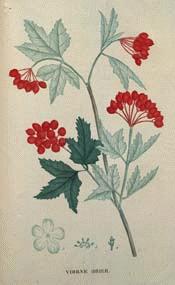- ---Description--- Menstrual cramps, Miscarriage prevention, Fever, Headache, Arthritis, and Other pain.
- ---Medicinal Action and Uses--- Here is another case where modern science supports folk wisdom – or at least some of it. It turns out that black haw may be a good treatment for some gynecological complaints. But pregnant women are advised against using it.
- ---Side Effects or Negative Effects---
(Viburnum prunifoium)
Black Haw:
Black Haw – from the 1800 to Current Herb
Warning: Black haw contains salicin, a close chemical relative of aspirin. Because aspirin has been linked to birth defects, pregnant women should not take it.
—Botanical name— Viburnum prunifoium
—Chinese Botanical name—
This information clearly states that Black Haw does have benefit.
—Description— Menstrual cramps, Miscarriage prevention, Fever, Headache, Arthritis, and Other pain. #
—Family— Caprifoliaceae; other members include honeysuckle and elder.
— Synonyms— Viburnum
—Parts Used— Bark
—Constituents— Scopoletin, salicin
—Medicinal Action and Uses— Here is another case where modern science supports folk wisdom – or at least some of it. It turns out that black haw may be a good treatment for some gynecological complaints. But pregnant women are advised against using it. #
MENSTRUAL CRAMPS – A recent report published in the British journal Nature shows that black haw contains a uterine relaxant (scopoletin), thus supporting its value in treating menstrual cramps. Today in Germany, where herbal medicine is more mainstream than it is in the United States, black haw preparations are widely used for menstrual cramps. These products are not available in the United States, but the herb itself is easily obtained.
MISCARRIAGE PREVENTION – This herb has been used for centuries to prevent miscarriage. As a uterine relaxant, black haw may indeed do the job. Unfortunately, it also contains salicin, a close chemical relative of aspirin. Because aspirin has been linked to birth defects, pregnant women should not take black haw.
FEVER, HEADACH, ARTHRITIS, AND OTHER PAIN – The aspirin-like chemical in black haw may reduce fever and pain.
—Nutrient Source—
—Side Effects or Negative Effects— #
Like aspirin, the salicin in black haw is a pain reliever (analgesic), which may contribute to the herb's ability to relieve menstrual cramping. However, aspirin has also been implicated as a cause of birth defects in the children of women who take it while pregnant.
Aspirin is most hazardous to the unborn early in the pregnancy. Recognizing this, the classic British herbal Potter's New Cyclopaedia of Botanical Drugs and Preparations says black haw should be used only during the final five weeks of pregnancy to prevent threatened prematurity.
Any woman facing possible premature birth should discuss her situation with her ohstetrician. Most physicians advise bed rest for threatened prematurity, along with increased fluid intake and no breast or sexual stimulation. Drugs (including herbs) are a last resort and should only be used with the consent of a doctor.
Parents should not give black haw to children under 16 who are suffering fevers related to colds, flu, or chicken pox, because its salicin may increase the risk of Reye's syndrome, a rare but potentially fatal childhood disease.
Large doses of black haw may produce upset stomach, nausea, vomiting, and/or ringing in the ears (tinnitus), especially in those sensitive to aspirin.
For otherwise healthy non-pregnant, non-nursing adults, black haw is considered safe in amounts typically recommended.
Black haw should be used in medicinal amounts only in consultation with your doctor. If minor discomforts such as stomach upset or ringing in the ears develop, use less or stop using it. Let your doctor know if you experience any unpleasant efforts or if menstrual cramps do not improve significantly after two weeks.
—Deterrent—
—References— “The Healing Herbs – The Ultimate Guide to the Curative Power of Nature's Medicines” by – Michael Castleman
Copyright 1991; ISBN: 0-87857-934-6; Page 79 – 81
—Recipe—
—Definition— Analgesic Tinnitus
| Viburnum prunifolium |
 |
| European Cranberrybush |
 |
| Viburnum opulus LINN.) |
Generated on June 24, 2007
Updated on November 1, 20078
Note: Information and statements about the products on this Page, Book and/or PDF file, have not been evaluated by the Food and Drug Administration and are not intended to diagnose, treat, or prevent any disease. You should not use the information contained herein for diagnosing or treating a health problem or disease or prescribing any medication. If you have or suspect that you have a medical problem, promptly contact your health care provider.



